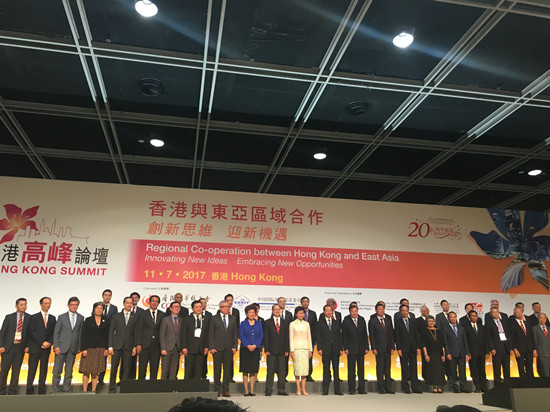
On 11 July 2017, during the Hong Kong Summit, the high-level government officials and representatives from business community of East Asian countries made remarks on promoting East Asia free trade and regional cooperation.
H.E. Mme. Yang Xiuping, Secretary-General of ASEAN-China Centre (ACC), together with Mr. Patrick Nip Tak-kuen, Secretary for Constitutional and Mainland Affairs of HKSAR, Mr. Pan Sorasak, Minister of Commerce of Cambodia, Mr. Ramon M Lopez, Secretary of Trade and Industry of the Philippines, Dr. Koh Poh Koon, Senior Minister of State, Ministry of Trade and Industry and Ministry of National Development of Singapore, Mrs. Apiradi Tantraporn, Minister of Commerce of Thailand, Mr. Cao Quoc Hung, Vice Minister of Industry and Trade of Viet Nam, Mr. Dody Edward, Special Advisor to the Minister of Trade on International Relations of Indonesia, and Mr. Wang Yanzhi, President of Silk Road Fund Co., Ltd. attended the Session and delivered speeches and interacted with each other on the topics such as opportunities and challenges of East Asia cooperation, accelerating regional integration, Hong Kong’s role in East Asia cooperation, and so on.
The participants recalled the history of East Asia cooperation, shared their views on the overall situation of East Asian economy, introduced the efforts made by the countries/region or organizations they represented, explored the opportunities and challenges of economic cooperation at present, and made relevant suggestions.
Mr. Patrick Nip Tak-kuen said that Hong Kong benefited from the “One Country, Two Systems” principle and the development of Guangdong, Hong Kong and Macao Bay Area. Hong Kong is an important international financial, shipping and trading hub, as well as a connector between the mainland market and international market. Hong Kong should give full play to its geographic advantage and seize the opportunities brought about by the Belt and Road Initiative so as to strengthen the ties with Chinese mainland and other countries and further raise the cooperation level. Mr. Pan Sorasak said that regional free trade arrangement, ASEAN Economic Community and Belt and Road Initiative are three important factors influencing the East Asian economic cooperation. All parties should make full use of those mechanisms to strive for the sustainable development of East Asia. Mr. Ramon M Lopez said that through free trade will bring competition but will also help the countries complement each other. Thus,each country should treat free trade in an open and inclusive manner and try to conclude the RCEP negotiation at an early date. Dr. Koh Poh Koon said that Singapore and Hong Kong should strengthen coordination and learn from each other since they are similar in economic structure and make joint efforts to promote the regional economic integration. Mrs. Apiradi Tantraporn said that Thai government attaches importance to regional connectivity and will increase the investment on infrastructure such as ports, airports and roads. Thailand would like to cooperate with other countries in this respect. Mr. Cao Quoc Hung said that Viet Nam has abundant labor force and huge market potential. As an important promoter of East Asia cooperation, Viet Nam would like to cooperate with others so as to make contributions to the development and prosperity of East Asia. Mr. Dody Edward introduced the economic and social development of Indonesia. He expressed the view that East Asian countries should make determined efforts to accelerate the pace of cooperation and create more opportunities for the development of East Asia. Mr. Wang Yanzhi said that East Asia cooperation will enhance more renminbi business, which is helpful for the long-term and healthy development of Hongkong's economy, trade and finance.